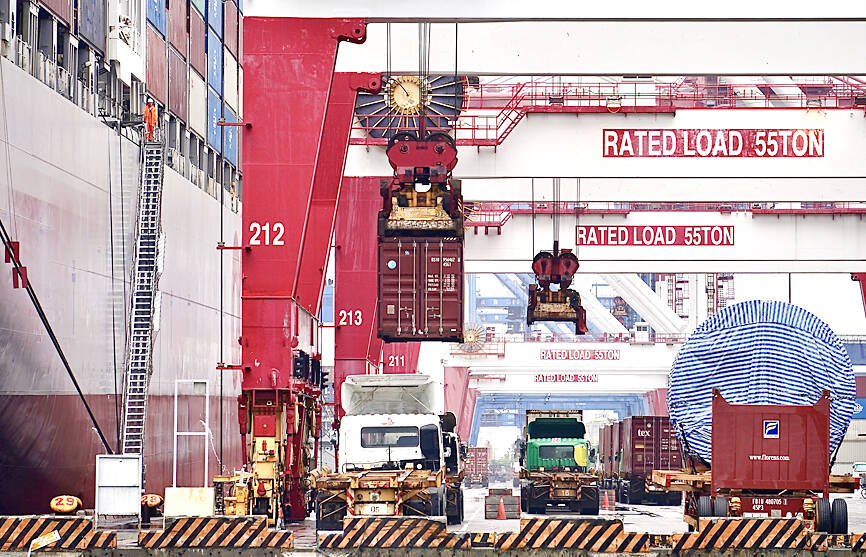Lawmakers yesterday continued to argue over stacking tariffs on exports to the US after US President Donald Trump’s country-specific levies took effect on Thursday last week.
The Office of Trade Negotiations on Friday confirmed that the US’ 20 percent tariff on Taiwanese goods would be stacked on top of existing levies, including most-favored nation duties and any anti-dumping or countervailing tariffs.
Taiwan People’s Party Chairman Huang Kuo-chang (黃國昌) on Saturday accused the government of waiting until the tariffs had taken effect to tell the public that they would be stacked.

Photo: CNA
Democratic Progressive Party caucus chief executive Rosalia Wu (吳思瑤) said that the Executive Yuan at a news conference on April 4 explained that Trump’s tariff rate would be in addition to most-favored nation duties.
Huang said the government’s negotiating process has been opaque, and that ruling-party legislators defending the Executive Yuan not only shows their confusion about their roles, but the problems within the administrative team.
Chinese Nationalist Party (KMT) Legislator Hsu Yu-chen (許宇甄) yesterday also questioned the Cabinet for not clearly disclosing the stacking tariffs, effectively hiding the true effects of the levies.
The ministry’s report released this month reviewed the impact of Trump’s 20 percent “reciprocal” tariff, but did not include how it added up with other duties, Hsu said.
The report said the tariff could reduce the value of affected industries by 3 to 10 percent, but once the additional tariffs and effects of currency changes are added in, those numbers could easily double, he said.
Hsu and Huang requested that President William Lai (賴清德) inform the public about the full scope of tariff negotiations and his administration’s plans.
Wu yesterday again emphasized that the Executive Yuan had been transparent that the tariff rate would be combined with the most-favored nation duties.
The opposition parties’ claims that the government is hiding the truth are completely fictitious, she said.
The government is continuing to negotiate with the US to try and reduce the 20 percent tariff, which is the government’s most important issue right now, Wu said, asking for the opposition parties’ support.
Taipei City Councilor Yu Shu-hui (游淑慧) of the KMT said that when Japan noticed something was wrong with its talks, it promptly protested and negotiated with the US, ultimately securing an exemption from stacking tariffs.
If the Lai administration knew all along that tariffs would be stacked and did nothing about it, that is an even greater offense than hiding information, and the public would pay the price, Yu said.
Additional reporting by Tung Kuan-yi

The Coast Guard Administration (CGA) yesterday said it had deployed patrol vessels to expel a China Coast Guard ship and a Chinese fishing boat near Pratas Island (Dongsha Island, 東沙群島) in the South China Sea. The China Coast Guard vessel was 28 nautical miles (52km) northeast of Pratas at 6:15am on Thursday, approaching the island’s restricted waters, which extend 24 nautical miles from its shoreline, the CGA’s Dongsha-Nansha Branch said in a statement. The Tainan, a 2,000-tonne cutter, was deployed by the CGA to shadow the Chinese ship, which left the area at 2:39pm on Friday, the statement said. At 6:31pm on Friday,

The Chinese People’s Liberation Army Navy’s (PLAN) third aircraft carrier, the Fujian, would pose a steep challenge to Taiwan’s ability to defend itself against a full-scale invasion, a defense expert said yesterday. Institute of National Defense and Security Research analyst Chieh Chung (揭仲) made the comment hours after the PLAN confirmed the carrier recently passed through the Taiwan Strait to conduct “scientific research tests and training missions” in the South China Sea. China has two carriers in operation — the Liaoning and the Shandong — with the Fujian undergoing sea trials. Although the PLAN needs time to train the Fujian’s air wing and

The American Institute in Taiwan (AIT) put Taiwan in danger, Ma Ying-jeou Foundation director Hsiao Hsu-tsen (蕭旭岑) said yesterday, hours after the de facto US embassy said that Beijing had misinterpreted World War II-era documents to isolate Taiwan. The AIT’s comments harmed the Republic of China’s (ROC) national interests and contradicted a part of the “six assurances” stipulating that the US would not change its official position on Taiwan’s sovereignty, Hsiao said. The “six assurances,” which were given by then-US president Ronald Reagan to Taiwan in 1982, say that Washington would not set a date for ending arm sales to Taiwan, consult

A Taiwanese academic yesterday said that Chinese Ambassador to Denmark Wang Xuefeng (王雪峰) disrespected Denmark and Japan when he earlier this year allegedly asked Japan’s embassy to make Taiwan’s representatives leave an event in Copenhagen. The Danish-language Berlingske on Sunday reported the incident in an article with the headline “The emperor’s birthday ended in drama in Copenhagen: More conflict may be on the way between Denmark and China.” It said that on Feb. 26, the Japanese embassy in Denmark held an event for Japanese Emperor Naruhito’s birthday, with about 200 guests in attendance, including representatives from Taiwan. After addressing the Japanese hosts, Wang